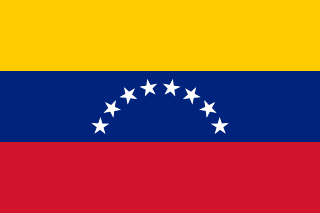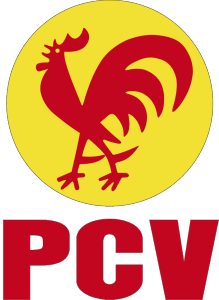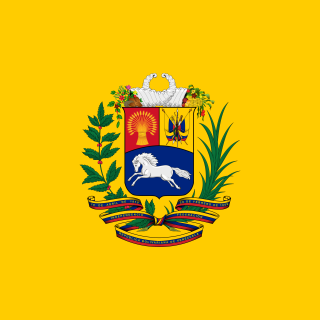
Venezuela, officially the Bolivarian Republic of Venezuela, is a country on the northern coast of South America, consisting of a continental landmass and many islands and islets in the Caribbean Sea. Venezuela comprises an area of 916,445 km2 (353,841 sq mi), and its population was estimated at 29 million in 2022. The capital and largest urban agglomeration is the city of Caracas.
Bolivarianism is a mix of panhispanic, socialist and national-patriotic ideals named after Simón Bolívar, the 19th-century Venezuelan general and liberator from the Spanish monarchy then in abeyance, who led the struggle for independence throughout much of South America.

The National Assembly is the legislature for Venezuela that was first elected in 2000. It is a unicameral body made up of a variable number of members, who were elected by a "universal, direct, personal, and secret" vote partly by direct election in state-based voting districts, and partly on a state-based party-list proportional representation system. The number of seats is constant, each state and the Capital district elected three representatives plus the result of dividing the state population by 1.1% of the total population of the country. Three seats are reserved for representatives of Venezuela's indigenous peoples and elected separately by all citizens, not just those with indigenous backgrounds. For the 2010 to 2015 the number of seats was 165. All deputies serve five-year terms. The National Assembly meets in the Federal Legislative Palace in Venezuela's capital, Caracas.

The Communist Party of Chile is a communist party in Chile. It was founded in 1912 as the Socialist Workers' Party and adopted its current name in 1922. The party established a youth wing, the Communist Youth of Chile, in 1932.

The Communist Party of Venezuela is a communist party in Venezuela. Founded in 1931, it is the oldest active political party in Venezuela, and was the country's main leftist party until it fractured into rival factions in 1971. The PCV currently opposes the government of Nicolás Maduro.

The president of Venezuela, officially known as the President of the Bolivarian Republic of Venezuela, is the head of state and head of government in Venezuela. The president leads the National Executive of the Venezuelan government and is the commander-in-chief of the National Bolivarian Armed Forces. Presidential terms were set at six years with the adoption of the 1999 Constitution of Venezuela, and presidential term limits were removed in 2009.
Venezuelan Popular Unity is a left-wing political party in Venezuela. It supported president Hugo Chávez and currently supports his successor Nicolás Maduro. It won one seat in the National Assembly in the 2005 Venezuelan parliamentary election. It merged into the United Socialist Party of Venezuela in 2007 but then was reinstated as a party in 2008.

The United Socialist Party of Venezuela is a left-wing to far-left socialist political party which has been the ruling party of Venezuela since 2007. It was formed from a merger of some of the political and social forces that support the Bolivarian Revolution led by President Hugo Chávez.

The Republic of Venezuela was a democratic republic first established in 1958, and replaced in 1999 by the Bolivarian Republic of Venezuela. Venezuela saw ten years of military dictatorship from 1948 to 1958. After the 1948 Venezuelan coup d'état brought an end to a three-year experiment in democracy, a triumvirate of military personnel controlled the government until 1952, when it held presidential elections. These were free enough to produce results unacceptable to the government, leading them to be falsified and to one of the three leaders, Marcos Pérez Jiménez, assuming the Presidency. His government was brought to an end by the 1958 Venezuelan coup d'état, which saw the advent of democracy with a transitional government under Admiral Wolfgang Larrazábal in place until the December 1958 elections. Prior to the elections, three of the main political parties, Acción Democrática, COPEI and Unión Republicana Democrática, with the notable exclusion of the Communist Party of Venezuela, signed up to the Puntofijo Pact power-sharing agreement.

The president of the National Assembly is the presiding officer (speaker) of the National Assembly, Venezuela's unicameral legislature. The president's term coincides with the term of the legislature. The post has existed since the election of the first National Assembly in 2000. Before the creation of the National Assembly with the adoption of the 1999 constitution, the country's legislature was the bicameral Congress, which contained the Senate and the Chamber of Deputies. The last president of the Senate was Luis Alfonso Dávila, and the last president of the Chamber of Deputies was Henrique Capriles Radonski.
Popular Will is a political party in Venezuela founded by former Mayor of Chacao, Leopoldo López, who is its national co-ordinator. The party previously held 14 out of 167 seats in the Venezuelan National Assembly, the country's parliament, and is a member of the Democratic Unity Roundtable, the electoral coalition that held a plurality in the National Assembly between 2015 and 2020. The party describes itself as progressive and social-democratic, and was admitted into the Socialist International in December 2014. Observers have also described it as being centrist, or centre-left.

The Simón Bolívar Great Patriotic Pole is a left-wing socialist and Chavist electoral alliance/popular front of Venezuelan political parties created in 2012 to support the re-election of Hugo Chávez in the 2012 presidential election.
El Trienio Adeco was a three-year period in Venezuelan history, from 1945 to 1948, under the government of the popular party Democratic Action. The party gained office via the 1945 Venezuelan coup d'état against President Isaías Medina Angarita, and held the first democratic elections in Venezuelan history, beginning with the 1946 Venezuelan Constituent Assembly election. The 1947 Venezuelan general election saw Democratic Action formally elected to office, but it was removed from office shortly after in the 1948 Venezuelan coup d'état.

Hoxhaism is a variant of anti-revisionist Marxism–Leninism that developed in the late 1970s due to a split in the anti-revisionist movement, appearing after the ideological dispute between the Chinese Communist Party and the Party of Labour of Albania in 1978. The ideology is named after Enver Hoxha, a notable Albanian communist leader, who served as the First Secretary of the Party of Labour.
Come Venezuela is a classical liberal political party in Venezuela headquartered in the city of Caracas. It has parliamentary representation in the National Assembly. Its registration as a political party has not been granted by the National Electoral Council.
Rosmit Mantilla is a Venezuelan politician, who was elected to the National Assembly of Venezuela in the 2015 Venezuelan parliamentary election. He is noted as the first openly gay politician ever elected to the National Assembly.
Parliamentary elections were held in Venezuela on 6 December 2020. Aside from the 167 deputies of the National Assembly who are eligible to be re-elected, the new National Electoral Council president announced that the assembly would increase by 110 seats, for a total of 277 deputies to be elected.

Juan Gerardo Guaidó Márquez is a Venezuelan opposition politician. He belonged to the social-democratic party Popular Will, and was a federal deputy to the National Assembly representing the state of Vargas. On 23 January 2019, Guaidó and the National Assembly declared that he was acting president of Venezuela, starting the Venezuelan presidential crisis by challenging Nicolás Maduro's presidency. In December 2022, opposition parties voted to dismiss Guaidó as interim president, choosing Dinorah Figuera as a successor on 5 January 2023 and ending Guaidó's presidential claim.

The Popular Revolutionary Alternative is a Venezuelan Chavista political coalition made up of socialist and leftist parties critical of the administration of Nicolás Maduro.











